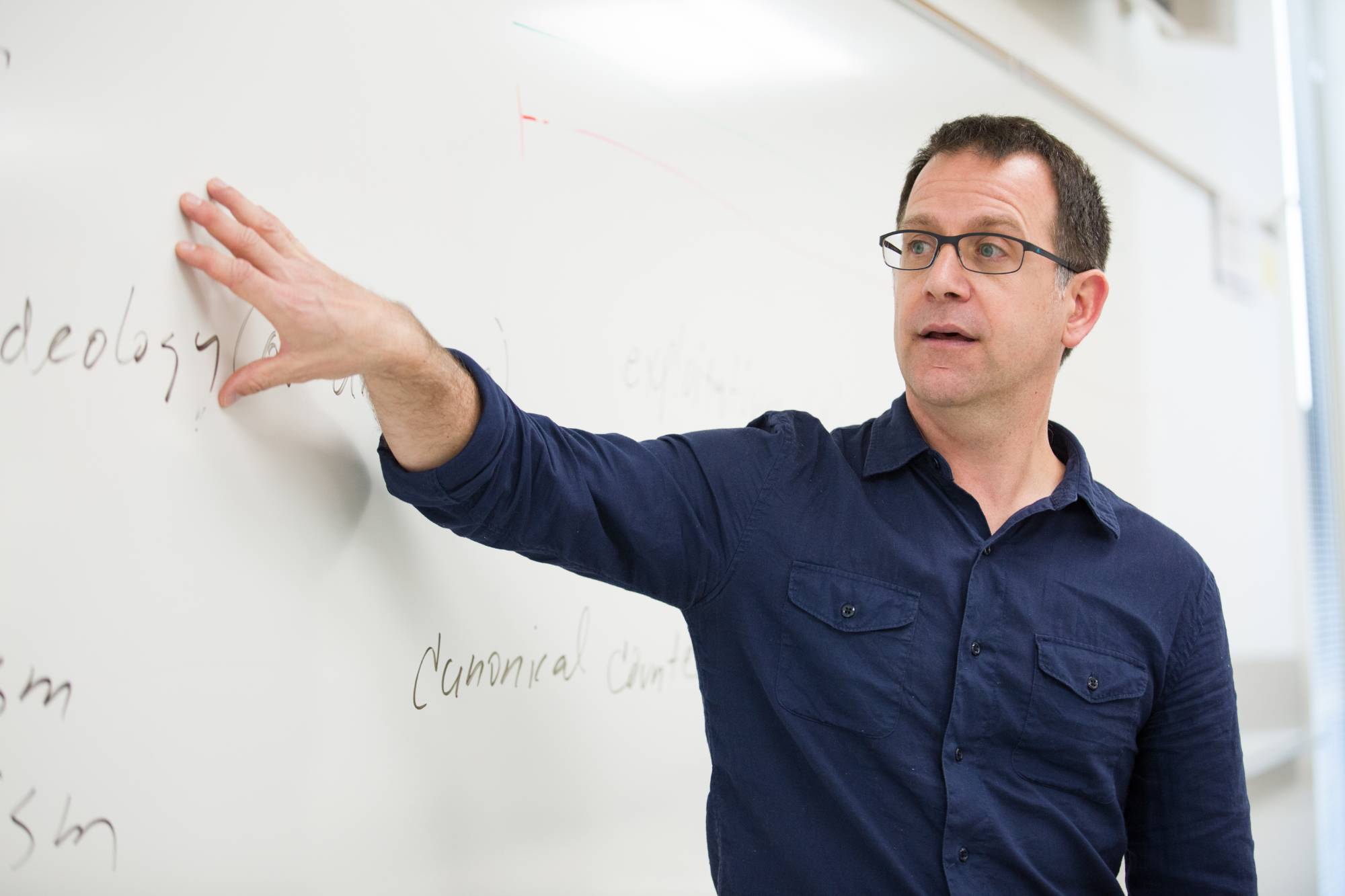Master of Arts in English Student Handbook
The Master of Arts in English Literature Student Handbook is produced by the program, and contains all relevant policies from both the program and the Graduate School. The handbook helps to both frame expectations for the MA English Literature community, and to communicate these expectations to students in a succinct and effective manner. Along with program policies and procedures, the handbook also includes student resource information. Finally, the handbook works in concert with Graduate School policies, and includes links to the Graduate School webpage throughout. Students are encouraged to reach out to their advisor with any questions, and/or to consult the Graduate School webpage found here.
Rules and policies are reviewed annually and may be changed at any time without prior notice; the community will be notified of changes that occur after the Student Handbook is published each fall.

MA Student Handbook
The Master of Arts in English Literature is a program intended to provide students with advanced studies in the various literatures written originally in English, as well as world literatures translated into English. The program concentrates on the range of British, American, Anglophone, and world literatures with emphasis on literary history and theory, history of genre, close analysis of individual authors and themes, and cultural context.
The program offers the option of two tracks: one requires 33 hours of coursework followed by a qualifying examination; the other requires 27 hours of coursework followed by a six-credit-hour thesis project. Regardless of the track chosen, all students must take courses in an author or topic, a literary period, and a genre. Additionally, the curriculum requires the Graduate Literary Studies Seminar, a course that introduces students to the history of literary studies and provides them with the conceptual and critical vocabulary of the discipline, as well as instruction in research methods.
-The M.A. in English Literature program has rolling admissions. To be considered, the candidate must submit:
· A one- two-page statement of purpose explaining the applicant's academic preparation, interest in this program, and professional goals.
· An original essay writing sample of 8 to 20 pages that demonstrates the writer's potential for literary analysis, including the incorporation of secondary sources. (It may be a paper written for a previous course).
· Contact information for three people who can assess the applicant's academic preparation.
3.1 Exam and Thesis Tracks
Students may elect to pursue an Examination Track or a Thesis Track to successfully complete their M.A. in English Literature degree. Students must choose their track after completion of 18 credits.
Examination Track: 33 credit hours of coursework (12 core requirements credits and 21 elective credits) plus a qualifying examination.
Thesis Track: 27 credit hours of coursework (12 core requirements credits and 15 elective requirements) plus a thesis (written over 6 credit hours).
3.2 Program Core Requirements
All degree-seeking students are required to take 12 core requirement credits:
· ENG 600: Graduate Literary Studies Seminar (3
Credits) NOTE: This seminar must be taken
before completion of more than 9 credit hours in the program for
degree-seeking students, and preferably in the student's first
semester of graduate study.
· ENG 624: Genre Studies (3 Credits)
· ENG 651: Literary
Period Seminar (3 Credits)
· ENG 661: Author or Topic Seminar
OR ENG 663: Shakespeare (3 Credits)
These core requirement credits give students a solid understanding of key areas in the field of literary study.
3.3 Elective Course Offerings
In addition to the program core requirements, the program offers a variety of graduate courses:
· ENG 603: Seminar in British Literature (3 Credits)
· ENG 605: Seminar in American Literature (3 Credits)
· ENG 612:
Women Writers (3 Credits)
· ENG 614: Literature of American Ethnic
Minorities (3 Credits)
· ENG 616: World Literature in English (3
Credits)
· ENG 624: Genre Studies (3 Credits)
· ENG 651:
Literary Period Seminar (3 Credits)
· ENG 655: History of Literary
Criticism and Theory (3 Credits)
· ENG 661: Author or Topic
Seminar (3 Credits)
· ENG 663: Shakespeare (3 Credits)
· ENG
695: Master’s Thesis (1 to 3 Credits)
The course offerings vary yearly to ensure students leave the program understanding the breadth of literary studies.
Students in both the thesis and exam tracks must complete the Responsible Conduct of Research (RCR) training by the time they have completed 18 credits of coursework, but preferably in the first semester of graduate study. More importantly, students should complete this requirement prior to engaging in any research activity (e.g. voluntary, independent, or supervised research, projects, theses, and dissertations). The sooner, the better.
M.A. English Literature students meet the RCR requirement by completing an online module available through Student Resources on the GVSU Graduate School.
The Thesis Track is appropriate for students who are interested in researching, organizing, and writing a sustained argument on a topic of interest within the field of literature. This track is strongly recommended for students who hope to pursue a PhD after the completion of their MA.
Students who elect the thesis track must complete 27 credit hours of coursework in the program (including the required core courses), after which they will begin the process of writing the thesis. (See "Thesis and Dissertation Information" on the Graduate School webpage for helpful tips regarding thesis preparation.
5.1 Description
The thesis is a document of at least 50 pages that typically consists of 5 chapters: an introduction, chapters 2-4, and a conclusion. In the thesis, students make an original contribution to their field while demonstrating the ability to maintain a sustained argument, incorporating current research, and exhibiting critical analysis.
5.2 Thesis Committee
The thesis committee consists of the Graduate Program Director and three professors. Students will ask a faculty member whose area of expertise aligns with the student's research interest to serve as the Chair of the thesis committee; the chair will work with the student to assemble the full thesis committee. (All committee members must hold full graduate faculty qualifications/status in the Graduate School.) By the time they have completed 18 credits of coursework, students should consult with the committee chair to receive approval of topic and begin writing the prospectus.
5.3 Prospectus Guidelines
In the prospectus students clarify their topic and present the idea formally both to the committee chair and to the program director. The prospectus must reveal an argument that is thorough, succinct, concise, and coherent, demonstrating critical engagement with current scholarly conversations in literary studies. Students will revise the prospectus based on comments from the committee before submission to the graduate program director.
The prospectus will follow all Modern Languages Association (MLA) conventions. It should be approximately 4-6 pages, plus a working bibliography. It must:
· Describe a focused topic
· State a provisional
thesis
· Provide literary review, i.e., collect and evaluate other
people's work on the topic
· Discuss how your work will contribute
to existing scholarship on the topic
Once the committee chair and the program director have reviewed the prospectus, they may approve it, decline to approve it and direct the student to consider other topics, or suggest revisions and read it again before making a final decision. Their decision in any case should be given in writing.
Only after successful completion of the prospectus may students register for thesis credit, ENG 695.
5.4 ENG 695: Master’s Thesis
After approval of the prospectus students register for one to six credits of Master’s Thesis hours (ENG 695) over two consecutive semesters. Students should be careful to register for 695 under their committee chair's name. Additionally, students may register for any combination of 695 credits - 695 is offered in one-, two-, and three-credit versions to complete the necessary number of credits.
At the end of the second semester, students must successfully defend the thesis project. Should students require more than 6 credits to complete the thesis project, they must register for ENG 696 credit until the project is complete.
5.5 Writing the Thesis
In consultation with their committee chair and the graduate
director, students should design a schedule that will allow them to
defend their thesis at the completion of six thesis credits. After
drafting each chapter of the thesis, the student will receive feedback
from the committee chair and committee members and make necessary
revisions. It is the student's responsibility to seek out comments
from the committee members for each chapter, and to engage in the
writing process by using university resources, e.g., the Writing Center, university libraries. The
completed thesis should follow the formatting requirements outlined in
the University Guidelines for Preparation of Theses and
Dissertations. Students can find the required formatting for the
thesis outlined on the Thesis and Dissertation Information page on the
Graduate School webpage under Student Resources.
The committee chair and committee members will read drafts of the
student's thesis and provide feedback. Once the chair indicates that
the thesis draft is ready for students to share with the full thesis
committee the student may do so. Typically, the timeline close to the
end of the thesis writing process is as follows:
· a) Four weeks or more prior to proposed defense date:
committee receives best, clean copy of the draft, meets to discuss the
draft and provides comments and requests for revision to the committee
chair and student. If the required revisions are major, the student
may move to b) below. If the required revisions are minor, the student
may move to c) below.
· b) Three weeks or more prior to proposed
defense date: committee chair meets with student to develop plan for
revision, particularly where substantial revisions are necessary. At
this time, committee chair and student have a clear conversation about
the possibility of completing revisions and readying for the defense
within two weeks. If the chair determines it is possible, given
feedback from the committee members, the process moves onto the next
step. If the chair determines it is not possible given feedback from
the committee members, the student must plan for defense the following
semesters. As part of the revision process, students must communicate
with the committee about feedback they have provided. Students must
also use university resources, i.e., the Writing Center, as part of the
revision process.
· c) Two weeks or more prior to planned defense
date: students share their revised thesis with committee. Should there
be additional minor revisions and committee members agree that two
weeks is a reasonable amount of time for the student to complete them
and prepare for the defense, the chair can let the program director
know to move forward with the thesis defense announcement to the
department and the Graduate School.
Once revisions have been completed and committee members have indicated their support, students are ready for the thesis defense.
Note: In the event that revision requests are so substantive that the student cannot complete them in the typical time frame, the chair must delay the proposed defense date. The chair communicates this to the student. As they prepare for defense the following semester, the student may speak to the committee members about the comments they have shared on the draft.
5.6 Thesis Defense
The Graduate School sets thesis defense deadlines each semester. The Graduate Program Director shares the dates with students and thesis committees. The thesis defense must be scheduled by the third week of the semester in which students wish to defend. The defense may not take place during the last three weeks of the semester.
The revised draft of the thesis must be submitted to the committee at least two weeks prior to the defense date, at which time the Graduate Program Director will provide a thesis defense announcement to the English Department and to the Graduate School. All English Department faculty and graduate students are invited to attend the defense. Interested faculty may read the thesis and participate in the discussion; graduate students may observe the defense. Students begin the defense with a brief statement (approximately 10 minutes) sharing how they arrived at their topic, what they found in their research, and where they hope to go with the work they've completed in the thesis.
After the defense, the committee chair asks the student (and any student observers) to leave the room for 15 minutes so that the committee may deliberate. After 15 minutes, the student is invited back into the exam room and the committee chair communicates the results: Pass, Pass with Distinction, Pass with Revisions, or Fail. In the case of a Pass with Revisions, the committee will require further revisions to the thesis; if so, students will have 30 days to revise and resubmit the thesis for final determination.
If the committee votes not to accept the thesis, students have the option of shifting to the Examination Track, which requires taking six additional credit hours of coursework and passing the qualifying examination.
5.7 Depositing the Thesis
Once the thesis is finally approved, students must submit the Committee Signature page, which they must submit to the Graduate School for Graduate Dean’s signature. Students must deposit the thesis to ScholarWorks@GVSU, the university's electronic repository for scholarship. Students must then formally apply to graduate via myBanner. (After logging into myBanner, select Student, then Student Records, and Apply to Graduate.)
The Examination Track is appropriate for students who wish to focus on coursework, rather than on intense independent research and study that the thesis option offers.
Students who elect the examination track must complete 33 credit hours of coursework in the program, including the required core courses. After all coursework is completed, they must pass their qualifying examinations to earn the MA degree.
6.1 Description
The exam consists of two essays written in a total of four hours. The purpose of the exam is for students to demonstrate a range of skills and knowledge in literary study, including familiarity with a variety of approaches to literature. Students choose to focus on two of a possible four areas, each of which corresponds with the core courses in the program:
· Major author
· Literary historical period
· Literary genre
· Criticism and theory
6.2 Exam Committee
The exam committee consists of the graduate program director and two professors chosen by students. By the completion of 18 credits, students consult with both faculty members, each specializing in one of the selected examination areas. The student will ask one of these faculty members to serve as the principal exam advisor. All committee members must hold full graduate faculty status in the Graduate School.
6.3 Reading Lists
The reading lists consist of major primary texts, as well as significant critical works in the field. Students draw up separate reading lists for each chosen area. Although students should consult with their committee during this process, it is the student's responsibility to develop these lists based on their research into each of their chosen areas. Students submit preliminary reading lists to the committee members, who may request revisions. After necessary revisions are completed, the faculty committee will then submit the lists to the graduate director for final approval. (This step helps to ensure consistency among the various exam committees over time.)
6.4 Examination
The Graduate School sets exam deadlines each semester. The Graduate Program Director shares the dates with students and exam committees. The exam must be scheduled by the third week of the semester in which students wish to sit for the exam. The exam may not take place during the last three weeks of the semester. On the day of the exam students choose two questions from a list: one from each selected area.
Students write for either:
· a single four-hour period or
· two 2-hour
periods—separated by an hour break—on the same day.
The exam committee reads both exam essays. Readers assign to each essay a grade: High Pass, Pass, or Fail. If the two readers disagree on their rating, the graduate director will serve as the third reader.
Unsuccessful students have another opportunity to write the exam in the following semester.
Students who do not earn a passing grade after two attempts will not be awarded the degree and will not be eligible to retake the exam. However, in consultation with the exam committee, and with final permission from the Graduate Program Director, students may instead, propose a thesis project, after which they must register for six hours of thesis credit. As with all theses, the principal advisor must approve a thesis prospectus before the student can register for thesis credits and the student must successfully complete the thesis to earn the MA degree. (See Thesis Track section for details).
Prior to completing 9 credits:
· Complete ENG 600
Between 15-18 credits:
· Completion of Responsible Conduct for Research module
· THESIS TRACK: Identify Thesis Committee (3 faculty members) +
graduate program director
· EXAM TRACK: Identify Exam Committee
(2 faculty members) + graduate program director
Between 18 - 21 credits:
· THESIS TRACK: Submission of Prospectus
· EXAM TRACK:
Create lists/areas of study for exam
Between 21 - 27 credits:
· THESIS TRACK: Approval of Prospectus (signed by Committee
Chair and Graduate Director)
· EXAM TRACK: Solidify lists/areas of
study for exam (confirmed by faculty advisor and Graduate Director)
Between 27 - 33 credits:
· THESIS TRACK: Write thesis
· EXAM TRACK: Study for exams
Final Projects:
· THESIS TRACK: Defend thesis
· EXAM TRACK: Write exam
8.1 Thesis Track Example
Semester 1
· ENG 600—Graduate Literary Studies
· ENG 624—Genre
Studies
· RCR Training
Semester 2
· ENG 651—Literary Period Studies
· ENG 661—Author or
Topic Studies
· Attend Graduate School Thesis Workshop
Semester 3
· ENG 612—Women Writers
· ENG 614—Literature of American
Ethnic Minorities
· Approach Faculty About Thesis Topics and
identify Thesis Committee Chair
Semester 4
· ENG 616—World Literature in English
· ENG
663—Shakespeare
· Write Prospectus
Semester 5
· ENG 655—History of Literary Criticism and Theory
· ENG
605—Seminar in British Literature
8.2 Exam Track with Study Abroad Example
Semester 1
· ENG 600—Graduate Literary Studies
· ENG 624—Genre
Studies
· ENG 614—Literature of American Ethnic Minorities
· Research Conduct Training
· Attend Study Abroad Fair and
Fundraising Workshops
Semester 2
· ENG 651—Literary Period Studies
· ENG 661—Author or
Topic Studies
· ENG 612—Women Writers
· Apply for Study Abroad
and Attend Passport Fair
Semester 3
· ENG 663—Shakespeare
· ENG 661—Author or Topic
Studies
· Exam Topics and Create Reading Lists
Semester 4
· ENG 616—World Literature in English
· ENG 603—Seminar
in British Literature
· Make an Advising Appointment with Faculty
Committee Chair Regarding Exam Topic, Reading Lists; Discuss Possible
Exam Dates for Next Semester
Semester 5
· ENG 655—History of Literary Criticism and Theory
· Prepare for Examinations
· Finalize Exam Date within First Three
Weeks of Semester
To make the most of student experience in the MA English Literature program, it is important to remain engaged:
· attend the Graduate School Orientation
· get to know
your program director and professors
- stop by during
office hours
- attend program events
· meet with
classmates outside of class
· find a mentor to guide you in your
academic pursuits
· look for opportunities to attend and/or
present at regional conferences
· read the handbook
For more information about The Graduate School, see their webpage.
9.1 Writing Center Resource
The Fred Meijer Center for Writing, with locations at the Allendale and Pew/Downtown Grand Rapids campuses, is a peer service available to assist students with writing for any graduate class. Writing consultants, both graduate and undergraduate, are trained to help with all stages of the writing process, from brainstorming to organizing to revising papers. There are 50-minute scheduled appointments, read-ahead appointments (Steelcase Knowledge Market only), and email consultations available for graduate students. The Center's services are free and students can drop in for a 30-minute session or make a 50-minute appointment in advance, either through the Writing Center website or by calling the Center - (616) 331-2922. Hours and locations are available on the Writing Center website (http://www.gvsu.edu/wc/) and additional information about graduate services can be found at: https://www.gvsu.edu/wc/graduate-student-services-100.htm
10.1 Tuition and Fees
Grand Valley graduate tuition rates are the same for Michigan resident and nonresident students alike. Current rates can be found on the Tuition and Fees page of the Financial Aid website.
10.2 Graduate Assistantships
The English Department currently offers two Graduate Assistantships (G.A.), each:
· a half-time position (ten hours per week)
· includes a
tuition waiver for 4.5 graduate credit hours each semester
· includes a stipend of $2000 for each semester
· begins and ends
with the academic calendar, August through April.
Assistantships are open only to students who have been admitted to the MA English Literature Program and who enroll in a minimum of 5 credit hours each semester.
Graduate
Assistantship 1—ENG 495 Assistant
Graduate
Assistantship 2—Communications Assistant
For more information on tuition and fees, please visit the costs portion of the GVSU Financial Aid website. For financial support, scholarship search, and filing for FAFSA, please visit the GVSU Financial Support website. Note: Grand Valley tuition rates are commensurate for Michigan resident and non-resident students alike. Tuition is based on the program in which you enroll.
10.3 Other Financial Support
For information about other Financial Support available to graduate students, including information about fellowships, research support, and a FAFSA application, see the Financial Support section of the Student Resources area of the Graduate School webpage.
The MA English Literature program welcomes students from all over the world to the program. It serves the needs of anyone interested in deepening their knowledge of American, European, and World literatures.
International students pay the same tuition rate as US residents.
For international student information and support, please visit the Padnos International Center website. PIC services as a primary resource for legal, cultural, and social matters for international students at GVSU.
All MA English Literature students are a part of the Graduate Registered Student Organization. Once students register on the webpage, they are eligible for funding professional development opportunities. There must be at least four student officers and one faculty advisor. (As a part of their duties, Graduate Assistants in the MA English Literature program must serve on the GSO.) Participation in the organization is renewed yearly.
The GSO hosts funding meetings about once a month. The organization makes available to all students (registered in >3 credits) $500 (domestic) or $750 (international) for travel per academic year. Funding is for attending conferences (not presenting at conferences or hosting events). If the student intends to present at a conference, they must first apply for funding from the Speaker Fund. Students must register in courses the semester following their conference.
Funding requests should be submitted to the M.A. in English Literature GSO officers two weeks in advance of that meeting to get on the docket. An officer must attend the meeting to meet the eligibility for funding. See GSO webpage for more information and/or contact any MA English Literature Graduate Assistant.
Notes on Funding:
· Funding will not cover fuel or mileage for personally
owned vehicles, meals (unless included in the registration fee), taxi
fares, or traffic citations. These are considered individual
costs.
· Registration fees, airfare, or lodging can be pre-paid
before the conference.
· Bus, train, and car rental fees will be
reimbursed after the conference.
· Appropriate reimbursement forms
need to be submitted within 10 business days upon completion of
travel.
· Direct travel reimbursement forms to The Graduate School.
Any questions and/or requests regarding travel expense reimbursements are to be directed to the Graduate School, specifically:
Irene Fountain
318 DeVos Center, Pew Campus
(616) 331-7123
fountaii@gvsu.edu
For more information, refer to the Graduate Funding Board Bylaws or contact an M.A. in English Literature Graduate Student Organization Officer.
13.1 Eligibility for Conference Funding
While the GSO supports student attendance at conferences, the Graduate School also makes available funding for students who are presenting their own work in a conference or other professional setting via the Academic Conference Fund. Requests for funding can be made via the "Apply Now!" link at the Academic Conference Fund website. Reimbursement paperwork should be sent to the Graduate School: [email protected].
Funding eligibility is open to all graduate students who are the primary presenter of research* at a professional conference, or whose creative work* is accepted for an exhibition or performance at a recognized event. Should multiple students submit for the same presentation, only the student named first in the proof of acceptance will be considered for funding.
To be considered for funding, students must:
· have the written support from a faculty member who can
attest to the quality of the student’s work or the academic benefit of
attending the conference/meeting.
· be in good academic standing
with the University.
· be current graduate students, or recent
graduates (within two semesters) whose research was accepted for
presentation prior to graduation.
*“Research” and “creative work” refer to work that was done as part of the student’s graduate program.
Please see the Academic Conference Fund page (linked above) for details of funding deadlines and reimbursement procedures.
14.2 Applying to Attend a Conference
IF the CONFERENCE IS BETWEEN:
July 1 - September 30
October 1 - December 31
January 1 -
March 31
April 1 - June 30
YOU SHOULD APPLY:
May 1
August 1
November 1
February 1
Applications will be accepted on a per-quarter basis for the July 1-June 30 fiscal year until each quarter's funds have depleted. Awards will be funded in the order they are received.
14.3 Reimbursement
For reimbursement after the conference, the student must submit the following typed forms to The Graduate School within 10 business days from the last day of the conference:. Complete the appropriate Travel and Expense Form found on GVSU's Business and Finance webpage. Be sure to review the T&E EXAMPLE for more instructions on how to complete the form.
Grand Valley State University complies with IRS regulations on reimbursements. Please be sure to review the GVSU Travel Policy and Procedures website.
Students who may experience hardship in waiting for a reimbursement may contact [email protected] prior to travel with an explanation of your circumstances.
This program is housed at Edge Hill University in Ormskirk, a twelfth-century market town situated near Liverpool and Manchester. Students visit the physical settings of some of the most important authors in the English literary tradition, including Shakespeare, the Romantic poets, and Charles Dickens. Additionally, students have the opportunity to work on their own writing as they experience and explore the United Kingdom. While living alongside British students in dormitories at Edge Hill University, and studying and visiting important cultural sites, students immerse themselves in the culture of the U.K. And with weekends free, students have the opportunity for independent travel and exploration. The program offers both undergraduate and graduate credits through the study abroad program.
Excursions & Highlights
· Visit the physical settings of some of the most important
authors in the English literary tradition, including Shakespeare and
Wordsworth
· Excursions to Liverpool, Wales, the Lake District,
and Stratford-upon-Avon
· Focus on your reading and writing skills
surrounded by the inspiring landscapes of English literature
Graduate Courses Offered
Graduate students will register for a total of 6 credits:
· ENG
603 British Literature Seminar (3 credits)
· ENG
661 Author/Topic Seminar (3 credits)
Total Estimated Cost: $9,237*
1. Program Fee: $4,513 (paid to GVSU) includes:
Round-trip airfare
Accommodation
Excursions
All-ground
Transportation
Some meals
Additional meals ($400)
Personal
expenses
Passport Photos ($140)
ISIC Card—optional ($28)
2. Tuition: $3,906—Graduate (paid to GVSU)
3. Other Expenses: $818 (estimate)
Approximate costs; subject to change.
Financial Aid & Grants
Students can use financial aid, scholarships, grants, personal funds and alternative loans to fund study abroad. Scholarship options include but are not limited to the Faculty-Led Program Grant ($1,500), a need-based grant.
For more information on funding, visit www.gvsu.edu/studyabroad
Application
To apply for this program, go to www.gvsu.edu/studyabroad for detailed instructions. All program information, including courses, duration of program, dates, and other logistics are subject to change. Programs may be canceled due to extenuating circumstances.






[1387291639].jpg)
[1387291639].jpg)

